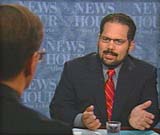| RAY SUAREZ: Secretary Rumsfeld's
Russian counterpart, Sergei Ivanov, said his country is looking
for what he called "managed deterrence not based on fear." Both
sides have committed to continued talks on offensive and defensive
weapons.
We get more on the Russian view now from Alexei Arbatov. He
is the deputy chairman of the defense committee of the Russian
Duma, and a member of the Yabloko Party, the leading Democratic
Opposition Party in Russia. He has been meeting with administration
officials and addressing arms control groups in Washington. Welcome
to the program.
ABM's importance
ALEXEI ARBATOV: Thank you.
 RAY
SUAREZ: Well, Russian leaders have endorsed the ABM Treaty
as a cornerstone of stability in the relationship between Russia
and the United States. Why has it been so important to Russia? RAY
SUAREZ: Well, Russian leaders have endorsed the ABM Treaty
as a cornerstone of stability in the relationship between Russia
and the United States. Why has it been so important to Russia?
ALEXEI ARBATOV: Because it has been always presumed
and still is presumed that stringent limits on defensive weapons
make it easier to reduce offensive weapons. And Russia is now
planning to go very far in reducing Russian strategic nuclear
forces. Against this background, preserving limits on defensive
systems, looks to Russia as a necessary pre-condition to preserve
stable deterrence.
RAY SUAREZ: Well, you just heard President
Bush a moment ago in our report talk about how for him and for
his administration the ABM Treaty is part of a past that is no
longer influencing today's events. If the administration goes
forward with the development of missile defense, what is the threat
to the Russians? What are they afraid of?
 ALEXEI
ARBATOV: Russians are afraid that this defensive system
may eliminate Russian strategic deterrent capability with respect
to the United States. At the same time, American strategic forces
would remain a very powerful deterrent capability against Russia.
It's not what politicians proclaim which matters for strategic
deterrence. It's what they do that matters. And Russian proposals
to jointly cut strategic offensive forces to low numbers, to cut
them by 80 percent, have met with great reluctance on the part
of the United States. ALEXEI
ARBATOV: Russians are afraid that this defensive system
may eliminate Russian strategic deterrent capability with respect
to the United States. At the same time, American strategic forces
would remain a very powerful deterrent capability against Russia.
It's not what politicians proclaim which matters for strategic
deterrence. It's what they do that matters. And Russian proposals
to jointly cut strategic offensive forces to low numbers, to cut
them by 80 percent, have met with great reluctance on the part
of the United States.
They're saying that they are conducting a review. Already many
months have passed. And it's not clear whether the United States
would agree to deep reductions of the strategic offensive systems.
If they do, then we might really believe that Americans want to
do away with nuclear deterrence, but before that, nuclear deterrence
will remain a reality, whatever politicians say in their official
statements.
Creating strategic deterrence
 RAY
SUAREZ: But the man who is conducting that review, Secretary
Rumsfeld, said during his visit to Moscow, "I don't go to bed
at night thinking that there's going to be an attack on the United
States from Russia. If we want to deter attacks it's not from
this particular state anymore." How does that figure into Russia's
thinking? You're also not pointing your weapons as at many American
targets either. RAY
SUAREZ: But the man who is conducting that review, Secretary
Rumsfeld, said during his visit to Moscow, "I don't go to bed
at night thinking that there's going to be an attack on the United
States from Russia. If we want to deter attacks it's not from
this particular state anymore." How does that figure into Russia's
thinking? You're also not pointing your weapons as at many American
targets either.
ALEXEI ARBATOV: We do not believe that Russia
is going to attack the United States or vice versa. However, as
long as we retain many thousands of nuclear weapons in our arsenals
and presently we have many thousands, both of us, it's clear that
they are targeted at each other because in the whole of the rest
world there are not so many targets for those weapons. As long
as they are targeted, they create this reality of strategic deterrence.
The only way to do away with it is to physically reduce those
weapons to
very low numbers. Otherwise declarations that deterrence is no
longer valid are
not taken in Russia with great trust. It looks very suspicious
to Russia because
declaring that nuclear deterrence is no longer valid on the one
hand and refusing
to go down in very deep reduction of strategic offensive forces
is not
compatible. And that makes Russians suspicious about American
claims that their
defenses will not be directed against Russia.
RAY SUAREZ: Does Russia have the feeling that
it's being, in effect, told what the situation is going to be?
Are these consultations that are now going on at this high level
or negotiations?
 ALEXEI
ARBATOV: Certainly those are not negotiations because
both parties do not trade for a compromise. They are not discussing
mutual concessions. Moreover, American side is emphasizing that
it doesn't want negotiations with Russia. That looks all that
more suspicious. I would say even that American desire to have
limited defenses against rogue states is not so troubling for
Russia as American rejection of the notion of negotiations. We
are not enemies any longer but we still are not allies. In the
nearest future we probably will not be formal allies, so we need
negotiations to resolve such issues as ballistic missile defenses. ALEXEI
ARBATOV: Certainly those are not negotiations because
both parties do not trade for a compromise. They are not discussing
mutual concessions. Moreover, American side is emphasizing that
it doesn't want negotiations with Russia. That looks all that
more suspicious. I would say even that American desire to have
limited defenses against rogue states is not so troubling for
Russia as American rejection of the notion of negotiations. We
are not enemies any longer but we still are not allies. In the
nearest future we probably will not be formal allies, so we need
negotiations to resolve such issues as ballistic missile defenses.
I think that many experts and strategists in Russia would agree
with amending the ABM Treaty so that the United States could test
some new defensive systems and eventually, if need be, deploy
them at the larger scale than presently permitted by the ABM Treaty.
However, what is of great concern to us is that the United States
are not willing to negotiate that, they are not willing to discuss
amendments. They say that they do not want any negotiations. They
are trying to persuade Russia that throwing away ABM Treaty is
fine. That is not agreeable to Russia.
A binary question?
RAY SUAREZ: Is this a question of missile defense
or no missile defense, strictly a binary question? Or could you
imagine a system that could be developed that would meet some
of these Russian concerns, that would be more limited in scope
in such a way that wouldn't threaten your country?
ALEXEI ARBATOV: Yes, I can imagine that. I
think that it's not such a complicated problem compared to the
problems that we have been resolving during the 30 years of negotiating
strategic arms control. I believe that it is quite possible to
retain the ABM Treaty as a framework but to provide amendments
that would permit limited defenses against rogue states or accidental
launch of a ballistic missile.
 RAY
SUAREZ: Have there already been discussions among your
colleagues in the Duma about how you will react, what you will
do if the United States unilaterally either broaches or simply
walks away from this treaty? RAY
SUAREZ: Have there already been discussions among your
colleagues in the Duma about how you will react, what you will
do if the United States unilaterally either broaches or simply
walks away from this treaty?
ALEXEI ARBATOV: Yes, there were many discussions
to the point. Certainly Russia would not consider itself bound
by the terms of Start I and Start II treaties. That means that
Russia most probably would put multiple warheads on its ICBMs,
which presently Russia is not doing.
RAY SUAREZ: And just to remind us, Start I
and Start II has limited the number of warheads deployed?
ALEXEI ARBATOV: Start II has banned totally
multiple warheads on land-based missiles. And land-based missiles
with multiple war heads which are called MIRV war heads were always
the bulk and the backbone of Soviet and Russian strategic deterrent
forces.
So Russia made a great sacrifice in agreeing to START II, sacrificing
the
most important, the most powerful element of its strategic deterrent.
But that
was linked to validity of the ABM Treaty, to preserving in the
future validity of
the ABM Treaty. Now if the ABM Treaty is unilaterally abrogated
by the United
States, Russia would certainly go for MIRVing its ICBMs.
RAY SUAREZ: Well, thanks a lot for joining
us, Alexei Arbatov.
ALEXEI ARBATOV: Thank you.
GWEN IFILL: We'll get the American point of
view Thursday, in a Newsmaker interview with Defense Secretary
Donald Rumsfeld.
See also:
ABM Treaty
the original at
www.pbs.org
|